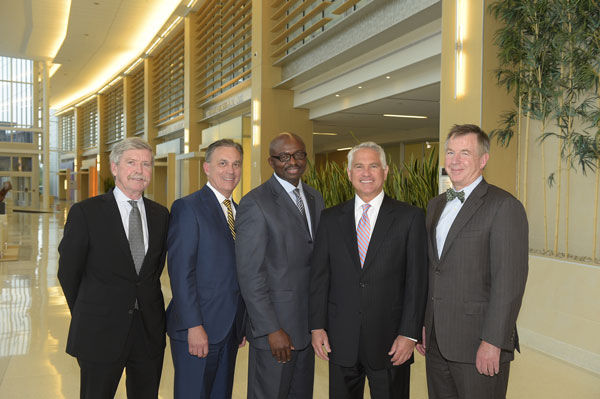By Philip Sean Curran, Staff Writer
Princeton HealthCare System will become a part of the University of Pennsylvania Health System through a merger that federal and state regulators still need to review, the two sides announced Wednesday.
Details of the arrangement have to be ironed out in the coming months, but one component calls for UPenn Health System to absorb the more than $300 million in debt Princeton HealthCare System is carrying. Once it is finalized, the merger will be the culmination of a process that involved Princeton HealthCare looking at what it described as 17 different prospective “partners.”
“We can confirm that a non-binding Letter of Intent for Princeton HealthCare System to join the University of Pennsylvania Health System has been signed,” said Susan E. Phillips, senior vice president of Penn Medicine in a statement. “Due diligence for this process is underway, and when the parties reach a definitive, binding agreement, it will be submitted to the state and all other necessary regulatory bodies for review.”
Princeton HealthCare System has annual gross revenue of about $450 million, employing approximately 3,000 people.
UPenn Health System includes the flagship Hospital of University of Pennsylvania, Penn Presbyterian Hospital and other facilities. It falls under the umbrella of Penn Medicine, which also includes the medical school at the Ivy League university in Philadelphia.
No layoffs are anticipated, said Barry S. Rabner, president and CEO of Princeton HealthCare, which runs University Medical Center of Princeton on Route 1 in Plainsboro and other facilities in the region.
“Clearly, a lot of the decisions being made by hospitals joining up into systems relates to scale,” Mr. Rabner said at a press conference with Penn officials at the hospital. “There’s a lot of debate about what is sufficient scale to be efficient and effective enough. Part of our thinking was that, at our current size, the scale was not adequate, and that it would be as part of the Penn System.”
In terms of governance, Princeton HealthCare will continue to have a board of trustees but one that will now include two Penn Medicine representatives. Likewise, Princeton will have two representatives on the Penn board.
Mr. Rabner will remain in charge of the hospital under the new arrangement, but he will be reporting to Ralph Muller, the CEO at UPenn Health System, which treats patients from parts of Delaware, Pennsylvania and New Jersey.
Some 25 to 30 percent of them come from the southern to Central Jersey markets, said Philip Okala, senior vice president for business development at UPenn Health System.
“The evolving nature of the healthcare marketplace is driving value, it’s making sure that we have access to our services across our entire market region,” he said. “And it’s not just access to services but quality services at an affordable price point — cheaper care and higher quality.”
Dr. Peter Quinn, senior vice president at UPenn Health System, said, “The only way to increase quality and lower cost is to coordinate care.”
Mr. Okala noted the two sides already have a relationship with a Penn Medicine-affiliated maternal fetal service at the hospital.
“We’re not really starting from scratch, so to speak,” he said. “There is existing physician-to-physician relationship that is flourishing right now.”
The sides will take the next few months to hash out a “definitive agreement” that will trigger a regulatory process that will take about a year. The New Jersey Attorney General’s Office, the Federal Trade Commission and Pennsylvania regulators still need to approve the proposed merger.
“We’re very optimistic that they’ll view this favorably,” Mr. Rabner said. “This change will have no impact on people’s access or their coverage.”
Asked about a New Jersey resident wanting to go to a UPenn Health System hospital out of state, Mr. Rabner said: “Whatever they would have to pay today, they’ll have to pay after we partner.”
One state lawmaker said Wednesday that the merger would benefit people in this part of New Jersey.
“The proposed merger between Princeton Health Care and the University of Pennsylvania healthcare system has the potential to bring even stronger patient care to central New Jersey by adding the expertise of the U. Penn professionals to the outstanding staff at Princeton,” state Assemblyman Andrew Zwicker (D-16) said. “Most importantly, these improvements in patient care should not result in an increase in out-of-pocket costs to the patient.”
A clarification was made to this story on July 18.

